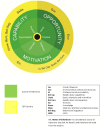Barriers and enablers to delivery of the Healthy Kids Check: an analysis informed by the Theoretical Domains Framework and COM-B model
- PMID: 24886520
- PMCID: PMC4047437
- DOI: 10.1186/1748-5908-9-60
Barriers and enablers to delivery of the Healthy Kids Check: an analysis informed by the Theoretical Domains Framework and COM-B model
Abstract
Background: More than a fifth of Australian children arrive at school developmentally vulnerable. To counteract this, the Healthy Kids Check (HKC), a one-off health assessment aimed at preschool children, was introduced in 2008 into Australian general practice. Delivery of services has, however, remained low. The Theoretical Domains Framework, which provides a method to understand behaviours theoretically, can be condensed into three core components: capability, opportunity and motivation, and the COM-B model. Utilising this system, this study aimed to determine the barriers and enablers to delivery of the HKC, to inform the design of an intervention to promote provision of HKC services in Australian general practice.
Methods: Data from 6 focus group discussions with 40 practitioners from general practices in socio-culturally diverse areas of Melbourne, Victoria, were analysed using thematic analysis.
Results: Many practitioners expressed uncertainty regarding their capabilities and the practicalities of delivering HKCs, but in some cases HKCs had acted as a catalyst for professional development. Key connections between immunisation services and delivery of HKCs prompted practices to have systems of recall and reminder in place. Standardisation of methods for developmental assessment and streamlined referral pathways affected practitioners' confidence and motivation to perform HKCs.
Conclusion: Application of a systematic framework effectively demonstrated how a number of behaviours could be targeted to increase delivery of HKCs. Interventions need to target practice systems, the support of office staff and referral options, as well as practitioners' training. Many behavioural changes could be applied through a single intervention programme delivered by the primary healthcare organisations charged with local healthcare needs (Medicare Locals) providing vital links between general practice, community and the health of young children.
Figures
Similar articles
-
The challenges of trying to increase preventive healthcare for children in general practice: results of a feasibility study.BMC Fam Pract. 2015 Aug 5;16:94. doi: 10.1186/s12875-015-0306-x. BMC Fam Pract. 2015. PMID: 26242986 Free PMC article.
-
Routine developmental screening in Australian general practice: a pilot study.BMC Prim Care. 2023 Jul 10;24(1):143. doi: 10.1186/s12875-023-02093-7. BMC Prim Care. 2023. PMID: 37430184 Free PMC article.
-
'Can they really identify mental health problems at the age of three?' Parent and practitioner views about screening young children's social and emotional development.Aust N Z J Psychiatry. 2013 Jun;47(6):538-45. doi: 10.1177/0004867413476756. Epub 2013 Feb 11. Aust N Z J Psychiatry. 2013. PMID: 23399856 Review.
-
Barriers to the implementation of preconception care guidelines as perceived by general practitioners: a qualitative study.BMC Health Serv Res. 2013 Jan 31;13:36. doi: 10.1186/1472-6963-13-36. BMC Health Serv Res. 2013. PMID: 23368720 Free PMC article.
-
Barriers and facilitators to clinical behaviour change by primary care practitioners: a theory-informed systematic review of reviews using the Theoretical Domains Framework and Behaviour Change Wheel.Syst Rev. 2022 Aug 30;11(1):180. doi: 10.1186/s13643-022-02030-2. Syst Rev. 2022. PMID: 36042457 Free PMC article.
Cited by
-
Proof-of-Concept Support for the Development and Implementation of a Digital Assessment for Perinatal Mental Health: Mixed Methods Study.J Med Internet Res. 2021 Jun 4;23(6):e27132. doi: 10.2196/27132. J Med Internet Res. 2021. PMID: 34033582 Free PMC article.
-
Perceived Barriers and Facilitators Regarding the Implementation of Gamification to Promote Physical Activity in the Neighborhood: Interview Study Among Intermediaries.JMIR Serious Games. 2024 Aug 28;12:e52991. doi: 10.2196/52991. JMIR Serious Games. 2024. PMID: 39196618 Free PMC article.
-
Using the theoretical domains framework to identify the sociocultural barriers and enablers to access and use of primary and maternal healthcare services by rural Bangladeshi women: a qualitative study.BMC Health Serv Res. 2024 Oct 17;24(1):1248. doi: 10.1186/s12913-024-11657-x. BMC Health Serv Res. 2024. PMID: 39420286 Free PMC article.
-
The quality of preventive care for pre-school aged children in Australian general practice.BMC Med. 2019 Dec 6;17(1):218. doi: 10.1186/s12916-019-1455-x. BMC Med. 2019. PMID: 31805928 Free PMC article.
-
Strategies to implement evidence-informed decision making at the organizational level: a rapid systematic review.BMC Health Serv Res. 2024 Apr 1;24(1):405. doi: 10.1186/s12913-024-10841-3. BMC Health Serv Res. 2024. PMID: 38561796 Free PMC article.
References
-
- National Preventative Health Taskforce. Australia: The Healthiest Country by 2020 –National Preventative Health Strategy – the Roadmap for Action. Canberra: Commonwealth of Australia; 2009.
-
- Government Australian. A National Health and Hospitals Network for Australia’s Future — Delivering Better Health and Better Hospitals. Canberra: Commonwealth of Australia; 2010. http://www.nhpa.gov.au/internet/nhpa/publishing.nsf/Content/Healthy-comm... (Accessed 5 Sep 2013)
-
- Council of Australian Governments. Investing in the Early Years: A National Early Childhood Development Strategy. Canberra: Council of Australian Governments; 2009.
-
- Australian Institute of Health and Welfare. A picture of Australia’s children 2012. Canberra: AIHW; 2012.
-
- Chrisopoulos S, Harford JE. Oral Health and Dental Care in Australia: key Facts and Figures 2012. Canberra: AIHW; 2013. Cat no DEN 224.
Publication types
MeSH terms
LinkOut - more resources
Full Text Sources
Other Literature Sources


